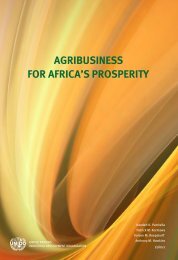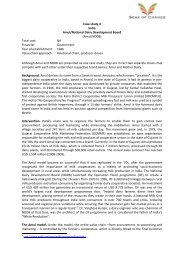Collection of Case Studies 2. - Seas of Change Initiative
Collection of Case Studies 2. - Seas of Change Initiative
Collection of Case Studies 2. - Seas of Change Initiative
You also want an ePaper? Increase the reach of your titles
YUMPU automatically turns print PDFs into web optimized ePapers that Google loves.
systems empowered farmers, while better price arrangements benefited both farmers and traders and moreeffective practices were extended.The potential <strong>of</strong> the vegetable oil seed sub-sector has been realised by the value chain actors themselves withlimited impulses and facilitation from others. These actors generated further interest in the sector’s developmentamong donors and other development organisations, researchers, public institutions, NGOs, and local andinternational financial institutions in the following their methodology.Donor contributions increased, OSSUP, the national multi-stakeholder platform, negotiated a guarantee schemefrom DANIDA for the Uganda National Agro Dealers Association to access imported hybrid seeds from MukwanoIndustries in order to distribute them to farmers. USAID and DANIDA support helped to set up practicaldemonstrations <strong>of</strong> how to improve agronomy practices. IFAD and the Ugandan government committedthemselves to supporting the production <strong>of</strong> local hybrid varieties.Banks created new financial products for small farmers. An agricultural loan guarantee scheme with StanbicCommercial Bank was negotiated for oil seed farmers to access loans for ploughing implements, with a 50%guarantee from donors, which benefited 50,000 producers. The Centenary Bank developed an Animal TractionLoan (leasing), secured by business contracts between farmers and processors, using farmer savings and creditfrom co-operative organisations.A number <strong>of</strong> actors joined together to successfully advocate for more conducive government policies andfinancing for the sub-sector. Government policies on liberalisation and privatisation were conducive to the sector’sdevelopment, creating an enabling environment for investment.Lastly, several contextual factors were conducive for the further development <strong>of</strong> the sub-sector: Restored peaceprovided political stability, which, in turn, contributed to the return <strong>of</strong> farming families. Production was alsoboosted by rising global food prices, high national population growth and ensuing demand for food, includingcooking oils. An expanding domestic market and the wider East African market have contributed to making thesector more dynamic.4. ImpactImproving poor farmer access to marketsIn the post-conflict areas <strong>of</strong> eastern, northern, and north-western Uganda, the sunflower industry was revived andannual production rose steadily from 70,000 mt in 2005 to over 300,000 mt in 2009. The price <strong>of</strong> oilseeds alsogrew from some USh 200/kg (€0.05) in 2007 to USh 700/kg (€0.18) in 2010, with a corresponding rise infarmer incomes. This increase in prices was partly due to an increase in global market prices; however theOSSUP platform also created more stability in prices through more co-ordination between members <strong>of</strong> theplatform. Poor households also benefited from more stable conditions for marketing their product. At least100,000 farmers now produce oilseed, benefiting more than 500,000 people. It is estimated that in the longterm, some 400,000 9 farmers and their families could benefit.SNV Uganda worked with Mukwano to enable producer market access by addressing physical access to markets,the structure <strong>of</strong> the markets, and producer skills. Interacting with markets is an important aspect <strong>of</strong> the livelihoodstrategies <strong>of</strong> many rural poor producers. This was seen as a critical element for producers to increase theirhousehold incomes while enhancing their food security.As a clear indication <strong>of</strong> empowerment, the more farmers learnt about governing themselves as a co-operative,the more they realised the gaps in their knowledge and practice, providing incentives for further improvements intheir farming and business practices. In addition, small producers enlarged their influence through theirrepresentation in Producers Organisations and in regional and national MSPs. This increased their engagement inmicro-macro linkages and allowed them to become more directly involved in broader VC management andgovernance.9These impact figures are deemed conservative by some <strong>of</strong> the researchers who looked into the processes and actions that evolvedfrom initiating the platform. The figures may actually be higher, but are very difficult to measure due to several reasons, which involvethe variety <strong>of</strong> oil seeds crops (not only sunflower but also sesame, soya, cotton etc) grown in different agro-ecological zones. Inaddition, these regions involve a variety <strong>of</strong> processing-market chains.30







